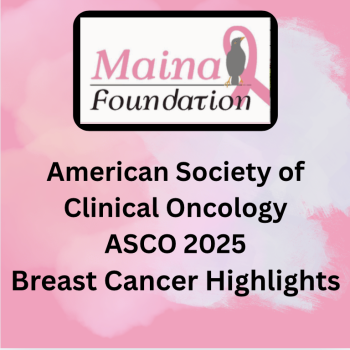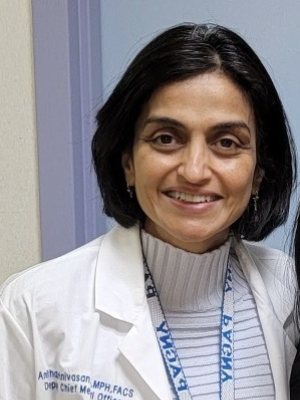
NEWSLETTER
June 2025

Welcome to the Maina Foundation Newsletter!
American Society of Clinical Oncology
ASCO 2025
Breast Cancer Highlights
By Manju Soni
Dear friends
I can’t believe half the year has already flown by.
Marcus Aurelius, Roman emperor, and a philosopher, said, “Time is a river of passing events, and strong is its current; no sooner is a thing brought to sight, then it is swept by and another takes its place, and this too will be swept away.”
How one approaches the passage of time is, I suppose, a matter of glass-half-full or glass-half-empty. I think I’m in the first category, and so, the fool I am, I set myself a new set of resolutions for the second half of this year.
And key amongst them is to be grateful—for family, for friends, and for my health.
I’m also grateful for the researchers and scientist who are diligently keeping breast cancer patients in their sights as they work on bringing us more advances in the treatment of this terrible cancer.
Here, hot off the press, are three important breast cancer highlights from this year’s American Society of Clinical Oncology (ASCO) you may find interesting.
Enhertu metastatic HER2-positive breast cancer:
One key finding presented at ASCO 2025 was related to metastatic (spread to other parts of the body) HER2-positive breast cancer.
The percentage of patients with metastatic HER2-positive breast cancer is estimated to be around 1-2.5% of breast cancer patients. This is an important subset of breast cancer patients, as metastatic disease is the most advanced and difficult-to-treat stage.
A new type of targeted therapy, called Enhertu, was highly effective for patients with metastatic HER2-positive breast cancer. Patients taking Enhertu lived significantly longer without their cancer progressing compared to those receiving standard chemotherapy.
Enhertu is a type of antibody-drug conjugate, which links a HER2-targeting antibody to a potent chemotherapy drug. This allows the treatment to specifically deliver the chemo to HER2-positive cancer cells.
Enhertu patients lived nearly twice as long without their cancer progressing. Enhertu also significantly improved overall survival, with a median of 23.9 months compared to 16.8 months for chemo.
Enhertu may fit in as a later-line therapy for these patients, after they have received the standard initial HER2-targeted treatments like Herceptin, Perjeta, and Kadcyla, Further research is still needed to determine its optimal placement in the treatment sequence.
The new Enhertu data presented at ASCO provides an important new treatment option for this patient population who have limited effective therapies available after progressing on initial HER2-targeted treatments.
Keytruda before chemotherapy:
Another study presented at ASCO 2025, showed that adding the immunotherapy drug Keytruda to chemotherapy before surgery improved outcomes for patients with triple-negative breast cancer
Triple-negative breast cancer is an aggressive subtype of breast cancer that accounts for ~10-15% of all breast cancers. It means the cancer is negative for the expression of estrogen receptors (ER), progesterone receptors (PR), and the HER2 protein. This means the cancer cells do not have targets for many of the standard hormonal and targeted therapies used to treat other breast cancer subtypes.
The study presented at ASCO, showed patients who received this combination of drugs were more likely to have no signs of cancer remaining in the breast or lymph nodes after treatment. This "pathological complete response" is an important predictor of long-term survival.
“Liquid biopsy" in breast cancer:
The use of "liquid biopsy" in breast cancer refers to a blood test that can detect and analyze cancer DNA circulating in the bloodstream.
The key benefit of liquid biopsy is that it is a minimally invasive procedure that can be repeated over time to monitor changes in the cancer. This can help guide treatment decisions in several ways:
· Detecting Minimal Residual Disease: Liquid biopsies can identify the presence of small amounts of cancer DNA after initial treatment, indicating there may still be cancer cells present. This can help determine if additional therapy is needed to prevent recurrence.
· Identifying Genetic Mutations: The tumor DNA in the blood can be analyzed to detect specific genetic mutations. This information can help select targeted therapies that are most likely to be effective for that patient's cancer profile.
· Monitoring Treatment Response: Levels of circulating tumor DNA can be tracked over time to see how the cancer is responding to a given therapy. This allows for faster adjustments to the treatment plan if the cancer is not responding well.
The study presented at ASCO found that a liquid biopsy test was able to identify breast cancer patients who would benefit from extended hormone therapy after their initial treatment. This helped prevent cancer recurrence in those patients.
Overall, liquid biopsy is an exciting new tool that is becoming increasingly integrated into breast cancer care. It provides a non-invasive way to get real-time information about a patient's cancer to optimize and personalize their treatment.
So, there you have it, three important updates from ASCO 2025 that continue to benefit breast cancer patients. The data presented show that even though there are challenges in the biotech market, innovation is not stopping.
Thank you for reading, and stay healthy, continue preventative care for you and your loved ones!!
And to our Maina Foundation newsletter readers, thank you for reading and your valuable support! Please consider forwarding this newsletter to anyone who may benefit from this information.
Manju Soni (she/her) (pen name: M. J. Soni) is a former eye surgeon turned author. She is the author of Defying Apartheid, her debut nonfiction book that captures her experiences of being a young activist against apartheid. Her short fiction and essays has appeared in Ellery Queen Mystery Magazine, Akashic Books, Apeiron Review and The Establishment. She’s a member of Crime Writers of Color and Sisters in Crime (National and Connecticut).
https://manjusoni.com
News!
We at Maina Foundation are thrilled to congratulate Dr. Anitha Srinivasan, MD, MPH, our long-time scientific board member, on becoming Chief Medical Officer at Metropolitan Hospital, New York.

The Metropolitan Hospital is a 150-year institution, delivering care to over 350,000 clinic patients and more than 50,000 emergency room visitors annually.
Dr. Srinivasan, a surgeon by training, grew up in Chennai, and did her medical education at Ramachandra Medical College, which was affiliated with Madras University at the time.
She moved to New York City in 1994 from Boston, and immediately felt at home in the sprawling, diverse city she’s come to call home.
Dr. Srinivasan’s hope for her patients in her new role is summed up in this quote, “I believe a public hospital system does best for everybody, irrespective of the ability to pay. My aspiration for this hospital and our system is to continue that, and I don’t want to give any different care than the best in the country to my patients here, and I don’t want to ever differentiate that, based on their ability to pay or their insurance status or anything else.”
Congratulations Dr. Srinivasan! We wish you the best in your new position.
Celebrating Fathers!

Maina Foundation hopes the men in our lives had a great Father’s Day.
We want to pay tribute to the men who help hold families together. Any cancer diagnosis affects not only the person diagnosed with it, but the people around them.
We’d like to honor the fathers, husbands, grandfathers, uncles, sons, brothers and friends, who provide their love and support to their loved ones dealing with breast cancer.
Thank You!!
We thank you for your continued support!
For more information on Maina Foundation, and to help its mission, go to https://mainafoundation.org or contact us at 860-434-3985 or info@mainafoundation.org
SAVE A LIFE - DONATE NOW
Donations can also be mailed to:
8 Peppermint Ridge, Old Lyme, CT 06371, USA
